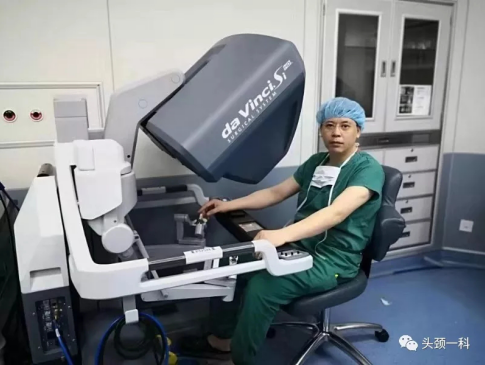100 cases of Da Vinci robot-assisted surgery have been successfully completed by the Department of Maxillofacial Otorhinolaryngology
100 cases of Da Vinci robot-assisted surgery of the head and neck have been reported as having been successfully completed by the Department of Maxillofacial Otorhinolaryngology, Tianjin Medical University Cancer Hospital.
Prof. Wang Xudong, Director of Maxillofacial Otorhinolaryngology Oncology, and his team from Tianjin Medical University Cancer Hospital, successfully completed the most recent robot-assisted radical thyroid cancer surgery, marking the 100th case of Da Vinci robot-assisted surgery of the head and neck.

Professor Wang Xudong has successfully completed 100 cases of Da Vinci robot-assisted surgery of the head and neck (88 cases of Robot-assisted breast-axillo thyroidectomy, 2 cases of Transoral robotic thyroidectomy, and 10 cases of oropharyngeal and tongue tumor resection), since the first Da Vinci robotic thyroid surgery was first performed in Tianjin in 2017. This patient had a fast recovery time and was discharged after 2-3 days. There were no complications such as bleeding or hoarseness, neck pain and swallowing discomfort were reduced, and no scars were left on the neck.

The Da Vinci Robotic Surgical System is currently the world's most advanced minimally invasive surgical assistance system, which has been widely used in the resection of a variety of tumors in the chest, abdomen, and pelvis and proven to have the same surgical safety as open surgery. Due to the lack of a stable cavity in the head and neck, there was delay in applying Da Vinci's robotic system to head and neck surgery. However in recent years, experts at home and abroad have proved that it has many unique advantages: first, it can enlarge the surgical view by 10-15 times that achieved with the naked-eye by using 3D with a high-resolution; second, the simulated robotic arm has 7 degrees more flexibility and accuracy than the human wrist; third, the surgical controller is more stable than the human hand. These unique advantages make it possible to complete operations in a narrow surgical space more accurately, and it is welcomed by surgeons and patients because it results in less pain but gives better protection to the neck, parathyroid gland and recurrent laryngeal nerve.